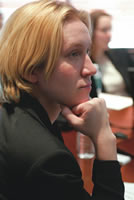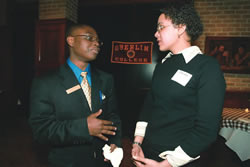 |
 |
 |
||||
 |
|
The program, which was aided by three faculty sponsors and several Oberlin fundraising officers, received financial support from Bela Szigethy ’77 and Stewart Kohl ’77, co-managers of The Riverside Company, a private equity firm. “We were so impressed with the students that we decided to take two interns from the program this summer, even though we’ve never had interns before,” says Kohl.
The development of the Business Scholars Program highlights an often-unrecognized reality at Oberlin: students do, in fact, have an interest in business. Moreover, many graduates—including those who expressed no attraction to the subject as students—have gone on to successful careers in finance, marketing, manufacturing, and advertising. From this bastion of liberal arts and politics—whose many graduates move into academia, social service, and government—fully 13 percent work in business and commerce. It’s a career concentration that lags just a few percentage points behind the top-ranking education (17 percent)—and ahead of the health professions (11 percent) and music and public service (about 8 percent each). Still, there exists a perception that Oberlin harbors surprise, if not distrust, of those who venture into the corporate world. “Business was a bad word back when I was in school,” says Scott Chaikin ’78, CEO of Dix & Eaton public relations in Cleveland, who fell into his career after freelancing with the firm after college. “In the 1970s, there were some anti-business feelings on campus. Today, I think there’s much less of that,” adds Kohl. “Students at Oberlin should have the opportunity to become exposed to the financial world. It’s good for the students, and it’s good for the business world.”
But hold on, says Business Scholars participant Joan Sapinsley ’73, managing director of financial services giant TIAA-CREF. Even she is only cautiously comfortable with a business presence at Oberlin: “As long as it’s limited to winter term, I’m fine. It’s exactly what winter term should provide—something you can’t get from the regular curriculum. I love the institution’s position now, and I would hate to see it become more career focused.”
Other alums, such as Steve Cullen ’78, president and CEO of NetMotion Wireless in Seattle, seem baffled by the controversy. “If you know a portion of your students will go into business, then give them a practical skill base so they can have some success in the field,” he says. “The analogy would be to send a musician out into the world without training—it’s foolish.” In Good Company Perry Boyle, the program’s 10-year director, was credited for his significant role in jump-starting the careers of many Oberlin business alumni, including Jacqueline Fleet Silver ’91, director of corporate staffing at Marriott International, whose Business Initiatives internship with Pepsi helped pay her Oberlin tuition bills while opening her eyes to a previously unconsidered career field. Next Page >> |

